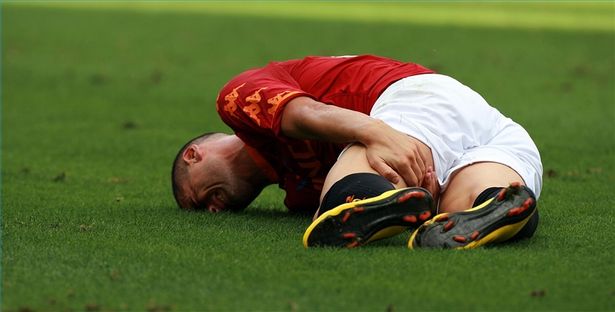
The Anterior Cruciate Ligament – or the ACL is the most commonly injured ligament in our knee. Surgery for an anterior cruciate injury has unfortunately become commonplace. An ACL tear and resulting anterior ligament surgery can challenge the toughest young athlete. Anterior cruciate ligament surgery is far from routine for many surgeons. Now more than ever before you need to know as much as possible about your ACL surgery options. At the bottom of this post are the essential questions you will need to ask if you or your child are considering ligament reconstruction surgery.
There are many reasons why ACL tears are increasingly more common.
- Loss of seasonality of sports
- Single sport specialization
- genetics
- poor training and biomechanics
We have a loss of seasonality in sports prone to cruciate ligament injuries. Our sports are no longer seasonal. Our soccer and lacrosse players now play year round. There’s no rest and their knee ligaments are not getting a chance to recover.
Single sport specialization is a creation of modern times. Our athletes were not meant to play only one sport year round. Most elite athletes today specialized in many sports when they were young. By concentrating on a single sport year round we are causing a lot of stress on some of the weakest links in your body. Anterior cruciate ligament tears are more common in children who focus on a single sport.
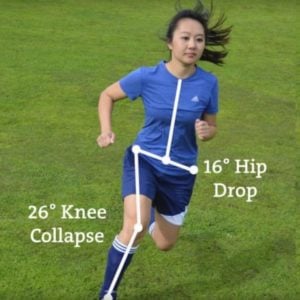
What is the ACL?
The ACL is one of the four strongest ligaments in our knee. It sits in the center and is made of a very tough tissue we call collagen. The ACL keeps our knee stable for sports involving pivoting, turning and twisting at rapid speeds. The ligament is actually made up of two pieces or bundles of ligament tissue. Sometimes an injury to your anterior cruciate ligament only involves one bundle and we refer to that as a partial ACL tear. More on partial ACL tears.
Why Did My ACL Tear?
Most ACL Injuries occur as a result of a non-contact twisting injury. You pivoted, you heard a pop, and likely fell to the ground. Get the ice… and the crutches. The swelling can be impressive. In athletes under 25 years of age, a twisting injury, feeling a pop and noticing a swollen knee a little while later carries a 75% chance of an ACL injury.
Do I Need an MRI?
Does a good sports doc need an MRI to prove that you have suffered an ACL tear? No. Our exam of your knee can tell us that. But we do obtain an MRI following ACL injuries. We obtain an MRI because 1. you expect it.. and 2. to make sure that you have not injured anything else- such as a meniscus or the cartilage on the ends of the bones.
Do I Need ACL Surgery?
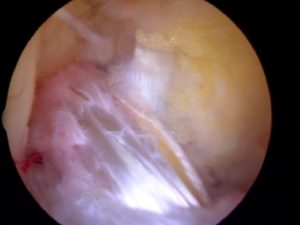
ACL Surgery Questions to Ask:
Why are you recommending ACL surgery? There is very little debate about how to treat an anterior cruciate ligament tear in a young athlete. Most doctors would recommend an early reconstruction. Many studies show that children are at a high risk of causing more damage to their knee if ACL surgery is not performed and the knee remains unstable.
- For those of you beyond 30 you may have a difficult choice to make. It is clear that all tears do not require ACL surgery. Are you being told that you need it fixed simply because it is torn?
- What about lifestyle modifications, activity modifications, therapy and bracing?
What is the anatomical method of ACL Surgery? : As you read about ACL surgery you will see references to many different techniques. Our thoughts about how to fix an ACL are changing. Surgery to replace a torn torn ligament have evolved A LOT over the past 5-7 years. Older methods did not place the ligament where nature intended it to be. Many sports docs are very knowledgeable about these latest technique modifications. This is an area of much interest. You should feel open to talk with your surgeon about what type of reconstructive surgery they perform.
- single bundle vs double bundle (probably doesn’ matter)
- anatomic versus traditional ACL surgery. Most surgeons have transitioned to an anatomic reconstruction.
How many ACL reconstructions do you perform in a year? VOLUME MATTERS! Do not use a surgeon who performs a only few reconstructions a year. Find a surgeon who performs a few per month or more. Click here to learn more about how to choose your ACL surgeon
What ACL graft would you recommend and why? We need to use something to reconstruct your new ACL with during surgery. See our video discussion below on graft choices. We have two broad options:
1. Allograft – tissue from a cadaver, and
2. Autograft – tissue from your own body.
The literature surrounding the use of allografts, especially in young patients has demonstrated a failure rate approaching 40% in some series. Bottom line, unless there is a strong reason why you can not use your own tissue (autograft) then you should probably not use allograft. Click here to learn more about ACL graft choices.
In the autograft category we have two main choices- a portion of your hamstring tendons, or the center of your patella tendon. Both grafts work well and stand the test of time in a properly performed surgery. A patella tendon graft certainly hurts more, but that may be worth it in certain individuals. Research is starting to show that a hamstring harvest in women may not be a good thing for a high level athlete. Women tend to be quadriceps dominant… so the front of their thigh is stronger than the back where the hamstrings are. It stands to reason that we do not want to make them even more quadriceps dominant by harvesting their hamstring tendons. In some people, especially elite athletes, a hamstring graft can produce weakness. While barely perceptible to most, some will notice the difference. Over my career the pendulum has swung from patella tendon grafts to hamstrings and it appears to be swinging back once again to patella tendon grafts. Have a long discussion with your physician.. question why they suggest a certain graft. This is especially true if considering ACL surgery with an allograft.
Should I start therapy before my ACL surgery? Yes.. prehabilitation can get your knee ready for the procedure and start the muscle reeducation process. Early research shows that PT before surgery improves your results after surgery. A flexible strong knee going in eases some issues following surgery.
Read on :
4 tips to prepare you for your ACL surgery



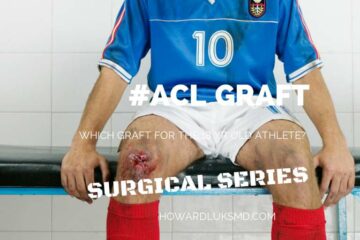

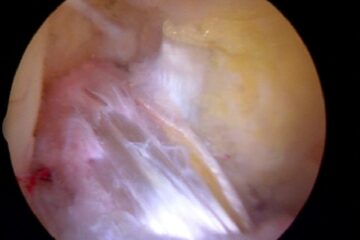








I am 15 years old and i am almost 4 months from my surgery date. Its almost summer and of course i am going to the beach, but i was wondering am i allowed in the ocean? i know i should ask my doctor, i will but i didnt want to hear bad news from him directly. I have to wear my brace for ever, pretty much the whole summer until i see him again in August. do you think i will be able to go swimming in the ocean like a normal vacation? I am going at the end of July and then again in the beginning of August.
Not the best idea … you need to prevent the knee from buckling or giving way. If it gives out just once or twice you risk injuring other structures in the knee… which could affect you for the rest of your life. Good Luck !
I’m 46 years old and was diagnosed with a tear involving the posterior horn and body of the medial menicus. This results in medial extrusion of the medial meniscus. A 1 cm gap is seen within the posterior horn of the medial meniscus in the area of the tear. There is a complete tear of the acl. This is most likely chronic given that the majority of the ACL appears to be degenerated and absent. There are severe changes of chondromalacia patella. There is a moderate size knee infusion. There is moderate cartilage loss within the medial knee compartment, consistent with changes of degenerative joint disease. There is also a Bakers cyst. Do you recommend surgery? If so what type of acl replacement should I have. Allograft or autograft. I would like to return to hiking n the great outdoors but my knee lacks mobility and the swelling never goes away leaving it stiff and it gives away but remarkable I’m not in a great deal of pain. I feel like they misdiagnosed my knee in regards to Degenerative joint disease. Wouldn’t I be in a lot of pain if that was the case. There saying a knee replacement will be necessary in the near future. My mother had a knee replacement and it was due to degenerative joint disease but she was in a great deal of pain. I’m not and this makes absolutely no sense to me. I’m aggrevated. Wouldn’t someone with degenerative joint disease be in a lot of pain. Don’t get me wrong I’m thankful I’m not in a lot of pain but because I’m not in pain is the reason this diagnosis seems wrong. Please reply. Things just don’t make sense to me.
yikes… go very slowly. Operating on an arthritic knee can cause the arthritis to worsen- or become symptomatic. There are plenty of people walking around with arthritis despite the fact that they have no pain.
I have a complete tear of my ACL, which I did 2 weeks ago skiing :-( . Good news is no damage to my MCL or meniscus and only a small amount of bone damage. I am getting about pretty well but feel some instability. PT said there is alot of movement of the knee but that my range of motion is good.
I am a 45 who is reasonably active. Whilst I don’t play competitive sport I do run and occasionally dance (plus ski) and run around after 3 young kids. I am trying to work out if surgery is a good option for me. I would appreciate any thoughts as it feels like a rock and a hard place!
Sorry Clare… I really can’t comment on specific treatment recommendations. If instability is an issue then surgery is an option to consider.
Hello Dr Luks,
Is it common for the ACL replaced knee to still have more joint play/anterior tibial translation compared to opposite non operated knee?
no
Hello Dr Luks,
This article was very informative and helpful to me.My doctor hasn’t talked much to me about my upcoming acl reconstruction surgery. I tore my acl two weeks ago, and I have a surgery scheduled two weeks from now.
I feel no pain in my knee anymore and I am able to walk,sit, squat and even jog for a few minutes. My knee hasn’t given out on me so far, swelling has been slowly decreasing as well.
My question is.. is it safe to do a little bit of jogging before my acl surgery? I have been on strict healthy diet(minimum portion), i was wondering if i can continue this past the surgery?
Thank You :)